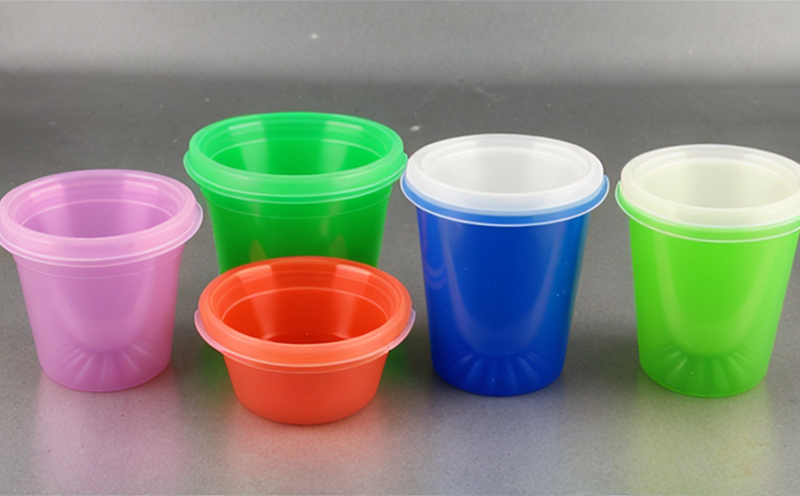JIS K 7191 Disposable Plastics Flexural Testing
In the realm of polymer and plastics testing, JIS K 7191 disposable plastics flexural testing is a critical procedure that evaluates the bending strength and flexibility of single-use plastic products. This test is particularly important for ensuring the safety, durability, and compliance of items like medical disposables, food packaging, and other consumer goods made from thermoplastics.
The primary objective of JIS K 7191 testing is to determine how a disposable plastic specimen will perform under bending stress. By subjecting specimens to controlled flexural loads, this test uncovers potential weaknesses that could lead to product failure during use or disposal. This information is invaluable for quality managers, compliance officers, and R&D engineers who are responsible for ensuring the reliability of their products.
The testing process involves several key steps. First, specimens must be prepared according to JIS K 7191 specifications, which include dimensions, thickness, and orientation. Then, these specimens are placed into a flexural testing machine where they are subjected to gradually increasing loads until failure occurs. The maximum load the specimen can withstand before breaking is recorded as its flexural strength.
Understanding the importance of this test extends beyond mere compliance with standards; it also helps businesses identify areas for improvement in their manufacturing processes. For example, if a particular type of plastic consistently fails at lower loads than expected, manufacturers may need to investigate factors such as raw material quality or processing conditions. Additionally, testing results can guide decisions about alternative materials that might offer better performance.
The JIS K 7191 test is especially relevant for industries where product safety and environmental impact are paramount concerns. In healthcare settings, ensuring that single-use plastics do not break down into harmful chemicals under normal usage conditions is crucial. Similarly, in food packaging applications, maintaining structural integrity while minimizing waste generation during disposal becomes a key consideration.
By incorporating JIS K 7191 testing into their quality control programs, companies can demonstrate commitment to both consumer safety and sustainability goals. This not only enhances brand reputation but also fosters trust among end users who value responsible manufacturing practices.
Why It Matters
The significance of JIS K 7191 testing cannot be overstated, especially when it comes to disposable plastics used in various sectors. This type of plastic is widely employed across multiple industries due to its lightweight nature and ease of production, but these benefits must not come at the cost of compromising product performance or safety.
For instance, medical disposables such as syringes or IV sets require materials that can withstand rigorous handling without breaking. Failure in this regard could lead to contamination risks or even injuries during administration. Similarly, food packaging designed for single-use must be robust enough to protect contents throughout the supply chain but flexible enough not to cause damage when opened by consumers.
The results from JIS K 7191 testing provide essential insights into how these products behave under stress, helping manufacturers make informed decisions about material selection and process optimization. Compliance with this standard ensures that all disposable plastics meet stringent quality benchmarks, thereby contributing to overall industry standards and public trust.
In today’s increasingly environmentally conscious world, understanding the lifecycle impacts of products is as important as ensuring their functionality during use. By conducting thorough flexural tests like those specified in JIS K 7191, manufacturers can ensure that their single-use plastics degrade appropriately after disposal, reducing environmental footprints.
Moreover, adherence to such standards demonstrates a company’s dedication to sustainable practices and responsible business operations. As consumers become more aware of the environmental consequences associated with waste generation, companies that prioritize eco-friendly solutions will likely see increased customer loyalty and market share growth.
Applied Standards
| Standard Name | Description |
|---|---|
| JIS K 7191-1:2015 | This part of JIS K 7191 specifies the procedure for determining flexural strength and modulus of elasticity in bending. It applies to thermoplastic materials. |
| JIS K 7191-2:2015 | This part outlines procedures for determining tensile properties of plastic materials by means of flexural testing. |
The application of these standards ensures consistency and accuracy in the measurement of flexural properties, which is crucial for comparing test results between laboratories or over time. Compliance with JIS K 7191 helps maintain high-quality production standards while fostering international collaboration within the plastics industry.
Scope and Methodology
| Aspect | Description |
|---|---|
| Test Specimen Preparation | The specimens should be cut from a single piece of the plastic material being tested. Dimensions and thickness must adhere strictly to JIS K 7191 specifications. |
| Loading Configuration | Specimens are supported at two points along their length, with one end fixed while the other is subjected to a gradually increasing load until failure occurs. |
| Data Collection | The maximum load applied before specimen fracture is recorded as flexural strength. Additionally, deflection measurements may be taken to assess modulus of elasticity. |
The methodology outlined in JIS K 7191 ensures precise and repeatable results, enabling accurate comparisons across different samples or over time. This consistency is vital for maintaining quality control throughout the manufacturing process and for ensuring that products meet regulatory requirements.
During testing, it's essential to follow all specified procedures meticulously to avoid introducing errors into the data set. Proper specimen preparation, appropriate loading techniques, and accurate measurement tools contribute significantly to obtaining reliable results. Regular calibration of equipment and adherence to standard operating procedures further enhance test reliability.





